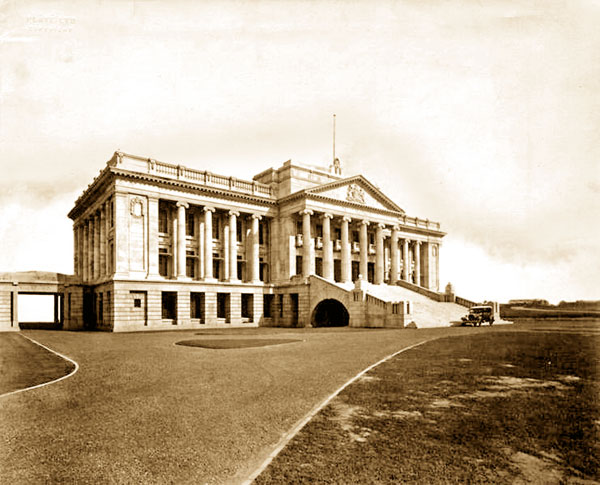Colonial Nostalgia
R P Fernando, London, UK email: rfernando@live.co.uk
In Sri Lanka there is a surprising degree of colonial nostalgia and hotels, schools or industries with a colonial connection frequently emphasise it. This paper highlights recent articles in the Sri Lankan press relating to governance, public services and industry mentioning the colonial link.

It is sometimes claimed that Empire loyalists are steeped in colonial nostalgia – a condition in which individuals have a rose-tinted view of the Empire where beneficial legacies are remembered and harmful ones conveniently forgotten. There may be some justification in this claim but Empire critics may be surprised to learn that there is a surprising degree of colonial nostalgia in some of Britain’s former colonies. In Sri Lanka, our hotels, schools or industries which have a colonial connection frequently emphasise it. The press there are even-handed. They report on the negative legacies of the colonial period but also on the positive ones. The latter are mentioned usually on the anniversaries of an event or the founding of an institution which involved the British. This paper highlights such articles in the press spanning a wide range of subjects relating to the governance, public services, industry and ancient history of Sri Lanka. The papers included are some of Sri Lanka’s leading newspapers: the Sunday Times, the Island and the Observer.
GovernanceDemocratic reforms took place in Sri Lanka, as in India, after world war one but at a slower pace. By the late 1920s, following a campaign for more Sri Lankan representation in the Legislative Council, a commission headed by the Earl of Donoughmore was sent to Sri Lanka to propose further reforms. Their recommendations led to the establishment of a State Council in which Sri Lankan ministers were in charge of the internal governance of the country and the franchise extended to all Sri Lankan over the age of 21. These elections took place in 1931 hence Sri Lanka had full franchise elections only 2 years after the UK. The importance of the Donoughmore Commission is discussed in the following article:
Hospitals
The British introduced Western medicine in Sri Lanka. A combined civil and military medical department was established by Governor North in 1801 and a separate civil department in 1858. The number of hospitals increased from 3 in 1858 to 183, including dispensaries, at independence in 1948. The following articles are about the Colombo General Hospital founded in 1864 and the Victoria Memorial Eye Hospital founded in 1906 at the instigation of Lady Ridgeway, the governor’s wife.
Schools
Sri Lanka
has an excellent educational system and had the second highest literacy
rate in Asia at independence. Western education was introduced in the
country in the 1830s and the Colombo Academy (now called Royal College)
was opened in 1836. By 1890, there were 436 government schools and 984
grant-aided schools. At independence, there were 2391 government schools
and 3,335 assisted schools. Sir Ivor Jennings was responsible for the
founding the University of Ceylon in 1942.
The following articles are about Royal College in Colombo, Kingswood
College in Kandy and a tribute to Sir Ivor Jennings.
(1) See:
(2) See:
(3) See:
Museum and Archaeological Research
Some of
the greatest achievements of the British in Sri Lanka, as in India, were
the establishing of the Archaeological Survey of Ceylon, which
rediscovered and restored Sri Lanka’s ruined cities, and the founding of
the Colombo Museum and the Ceylon Branch of the Royal Asiatic Society.
An issue arose that in schools in the 19th century pupils were taught
mainly British history. However, in the late 19th century, with the
wealth of new information becoming more widely known, British
educationalists realised that Sri Lankan history should also be taught.
(1) See:
(2) See:
(3) See:
Tea Industry
The tea industry was important during the British period and continues to be so today. Over a million people are now employed in the industry, which is one of Sri Lanka’s most important sources of foreign earnings. More than that, it is now part of the soul of the country. The following article is about James Taylor who introduced tea to the country:
Railways
At independence Sri Lanka had 912 miles of railways and carried 25m passengers annually. They connected all the main cities and towns and enabled agricultural products such as tea and rice to be transported. As in India the railways helped to unify the country and transformed public transport.
(2) See:Tourist Industry
The British established the tourist industry in Sri Lanka. They built hotels and rest houses on the coast, in wildlife reserves and near the ruined cities. Sir Samuel Baker created a hill station, Nuwara Eliya, commonly referred to as ‘Little England’, amidst the tea estates. Thomas Cook played a major role in encouraging international tourists. The following articles are about Mount Lavinia Hotel, a beach hotel in Colombo, and the Grand hotel in Nuwara Eliya:
Royal Visit
The Price of Wales undertook an extensive tour of the Empire in 1922. His visit to India was not particularly successful but he was welcomed everywhere he went in Sri Lanka.
(1) See:Such articles are unlikely to be published in the UK press due to political correctness here. When assessing the legacies of the Empire, more attention should be paid to publications by the locals during the colonial era (as in the review of Empireland in this site) and their descendents in commonwealth countries today.